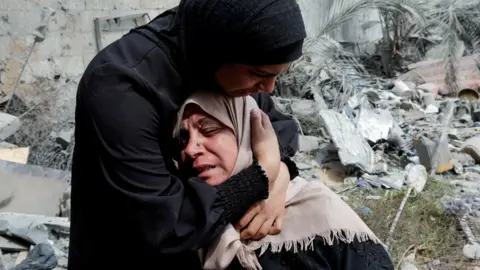The ongoing conflict in the Gaza Strip has escalated dramatically, with recent statements from senior Hamas officials indicating a hardened stance against further ceasefire discussions. Bassem Naim, a prominent figure within Hamas, asserted that there is “no point” in continuing negotiations for a ceasefire or the release of hostages while Israel intensifies its military operations against the Palestinian territory. This response comes on the heels of an Israeli military announcement detailing an expanded offensive aimed at decisively defeating Hamas and facilitating the return of hostages held by the militant group.
Israel’s military strategy reportedly includes the potential for a comprehensive takeover of Gaza, which would entail significant displacement of its population of approximately 2.1 million people. The Israeli officials have outlined their objectives in stark terms, indicating an intention to exert extensive control over aid amidst a severe humanitarian crisis exacerbated by a two-month-long blockade that has left Gaza facing critical food shortages.
Naim’s commentary not only rejects the possibility of re-engaging in negotiations, but it also highlights a profound sense of urgency within Gaza, where the humanitarian situation is becoming increasingly desperate. As military operations are set to expand, international observers, including the Secretary-General of the United Nations, António Guterres, have raised alarms about the potential for civilian casualties and further devastation within Gaza. Guterres cautioned that continued military actions could lead to countless civilian deaths and irreversible damage to an already beleaguered population.
Efforts to facilitate dialogue have encountered significant hurdles. The Israeli military’s plans are reportedly on hold until after a scheduled visit from U.S. President Donald Trump, suggesting a temporary reprieve that some officials perceive as an opening for diplomatic discussions. However, Naim’s dismissal of any further negotiations signals a deepening rift between the two parties. In light of the situation, UK Prime Minister Sir Keir Starmer and French President Emmanuel Macron have voiced their concerns about the recent escalation, advocating for a renewed peace process to address the ongoing conflict more effectively.
In the U.S., President Trump has committed to providing food assistance to Gaza’s residents, asserting the urgent need for humanitarian support. He emphasized the dire circumstances many individuals face, with resources dwindling due to ongoing military actions and the alleged hijacking of aid supplies by Hamas. Israel has been accused of blockade tactics that cut off essential supplies, intensifying the humanitarian crisis, with aid agencies warning of imminent mass starvation if conditions do not change.
Israel’s assertion of compliance with international law regarding humanitarian access contrasts sharply with accounts from various aid organizations disputing this claim. Observers note that the situation on the ground is deteriorating rapidly, as mass starvation looms on the horizon amid the prolonged blockade. Significant casualties have already been reported, with estimates indicating that over 52,000 individuals have lost their lives since the resumption of hostilities following a catastrophic cross-border attack on October 7, 2023, in which numerous individuals were killed and many taken hostage.
As tensions escalate, Israel’s military offensive continues to impact civilians gravely. The implications of the conflict extend beyond immediate military objectives, calling into question the humanitarian responsibilities of both sides involved. A resolution remains elusive as the cycle of violence persists, leaving a population in dire circumstances with limited prospects for relief or peace. The international community, while expressing concerns, faces the challenge of navigating the complex political landscape to facilitate a lasting and meaningful resolution to the ongoing crisis.



